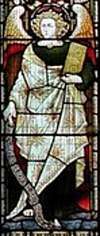Jerahmeel (archangel)
The Hebrew name Jerahmeel, which appears several times in the Tanakh (see the article Jerahmeel), also appears in various forms as the name of an archangel in books of the intertestamental and early Christian periods.

Jerahmeel | |
|---|---|
Statue of the angel Jeremiel in the Church of Our Saviour, Copenhagen | |
| Archangel | |
| Venerated in | Eastern Orthodox Church |
| Feast | 8 November |
| Attributes | Balance scales |
In the deuterocanonical book 2 Esdras, also known as 4 Ezra, which has come down to us in Latin and appears as an appendix to the Vulgate, as well as being canonical in the Russian and Ethiopian biblical canons. There is a reference in chapter 4 verse 36, to Jeremiel (in the Latin Ieremihel), which, however, does not occur in all the manuscripts. Other versions have Remihel, Oriel or Uriel.[1] In this passage the angel or angels (Uriel is also there) are answering Ezra's many questions about heaven and hell.
Jeremiel (under any of his name alterations: Eremiel, Remiel, Remihel, etc.) had a very dour yet comforting duty in the pre-Christian eras. He was set over Sheol (the underworld) in Abrahamic tradition, in particular the "Bosom of Abraham", a region of the underworld almost identical in concept to the Greek idea of Elysium. Here Jeremiel was responsible for placating the righteous souls awaiting the Lord who resided there. In the post-Christian world Jeremiel's duty evolved and is paired with St. Simon Peter as gatekeeper of Heaven. In both cases Jeremiel watches over and guides the holy deceased in their afterlife journey.
There are generally seven archangels venerated by the Orthodox Christians: Michael, Gabriel, Raphael, Uriel, Selathiel, Jegudiel, and Barachiel. But sometimes they also add an eighth, Jeremiel, to this number.[2][3] He is depicted holding balance scales in Orthodox iconography.
In the Apocalypse of Zephaniah, an apocryphal book which has come down to us in Coptic, the angel referred to as Eremiel tells Zephaniah
I am the great angel, Eremiel, who is over the abyss and Hades, the one in which all of the souls are imprisoned from the end of the Flood, which came upon the earth, until this day[4]
In two or three places in the Book of Enoch, available in Ethiopic, there are lists of angels. Included are Rame'el and Ram'el (in the same list). There are occasional references, in various spellings, in other apocryphal manuscripts.
For modern uses of the angel's name and identity, see the article Ramiel.
References
James H Charlesworth (ed) The Old Testament Pseudepigrapha, Darton, Longman & Todd, London 1983.
- Robert Weber (ed.) Biblia Sacra juxta Vulgatam Versionem, Deutsche Bibelgesellschaft, Stuttgart, 1969
- "The Synaxis of the Holy Archangels and All The Bodiless Powers ~ November 8th". stjohngoc.org. 1 November 2014. Retrieved 27 March 2019.
- Father George (7 November 2016). "Archangels and Angels According to Orthodox Christianity". saintandrewgoc.org. Retrieved 27 March 2019.
- The Apocalypse of Zephaniah, section 7, in Charlesworth, volume 1